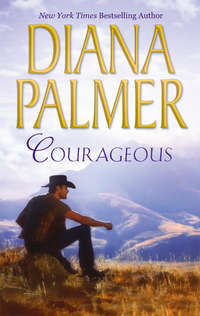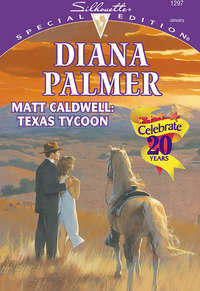
Полная версия
Texas Born
Roberta sucked in her breath. Fear radiated from her. “Cash Grier?”
Michelle nodded. “I figured it was the safest place. I told him I was worried about someone stealing them while I was at school.”
Which meant she hadn’t told the man that Roberta had slapped her. Thank God. All she needed now was an assault charge. She had to be more careful. The girl was too stupid to recognize her symptoms. The police chief wouldn’t be. She didn’t want anyone from law enforcement on the place. But she didn’t even have the grace to blush when Michelle made the comment about someone possibly “stealing” her stamp collection.
She got up from the table. She was thirsty, but she knew it would be disastrous to pick up her cup of coffee. Not until she’d taken what she needed to steady her hands.
She paused on her way to the bathroom, with her back to Michelle. “I’m... I shouldn’t have slapped you,” she bit off.
She didn’t wait for a reply. She was furious with herself for that apology. Why should the kid’s feelings matter to her, anyway? She pushed away memories of how welcoming Michelle had been when she first started dating Alan. Michelle had wanted to impress her father’s new friend.
Well, that was ancient history now. She was broke and Alan had died, leaving her next to nothing. She picked up her purse from the side table and went into the bathroom with it.
Michelle cleaned off the table and put the dishes into the dishwasher. Roberta hadn’t come out of the bathroom even after she’d done all that, so she went to her room.
* * *
Michelle had been surprised by the almost-apology. But once she thought about it, she realized that Roberta might think she was going to press charges. She was afraid of her stepmother. She had violent mood swings and she’d threatened to hit Michelle several times.
It was odd, because when she’d first married Dr. Alan Godfrey, Michelle had liked her. She’d been fun to be around. But she had a roving eye. She liked men. If they went to a restaurant, someone always struck up a conversation with Roberta, who was exquisitely groomed and dressed and had excellent manners. Roberta enjoyed masculine attention, without being either coarse or forward.
Then, several months ago, everything had changed. Roberta had started going out at night alone. She told her husband that she’d joined an exercise club at a friend’s house, a private one. They did aerobics and Pilates and things like that. Just women.
But soon afterward, Roberta became more careless about her appearance. Her manners slipped, badly. She complained about everything. Alan wasn’t giving her enough spending money. The house needed cleaning, why wasn’t Michelle doing more when she wasn’t in school? She wasn’t doing any more cooking, she didn’t like it, Michelle would have to take over for her. And on it went. Alan had been devastated by the change. So had Michelle, who had to bear the brunt of most of Roberta’s fury.
“Some women have mood swings as they get older,” Alan had confided to his daughter, but there was something odd in his tone of voice. “But you mustn’t say anything about it to her. She doesn’t like thinking she’s getting on in years. All right?”
“All right, Daddy,” she’d agreed, with a big smile.
He’d hugged her close. “That’s my girl.”
* * *
Roberta had gone away for a few weeks after that. Then, not too long after her return, they’d moved to Comanche Wells, into the house where Michelle had spent so many happy weeks with her grandparents every summer.
The elderly couple had died in a wreck only a few years after Michelle’s mother had died of a stroke. It had been a blow. Her father had gone through terrible grief. But then, so had Michelle.
Despite the double tragedy, Comanche Wells and this house seemed far more like home than San Antonio ever had, because it was so small that Michelle knew almost every family who lived in it. She knew people in Jacobsville, too, of course, but it was much larger. Comanche Wells was tiny by comparison.
Michelle loved the farm animals that her grandparents had kept. They always had dogs and cats and chickens for her to play with. But by the time Alan moved his family down here, there was only the small herd of beef cattle. Now the herd had been sold and was going to a local rancher who was going to truck the steers over to his own ranch.
Her door opened suddenly. Roberta looked wild-eyed. “I’m going back up to San Antonio for the night. I have to see Bert.”
“All...” She had started to say “all right,” but the door slammed. Roberta went straight out to her car, revved it up and scattered gravel on the way to the road.
It was odd behavior, even for her.
Michelle felt a little better than she had. At least she and Roberta might be able to manage each other’s company until May, when graduation rolled around.
But Gabriel had helped her cope with what she thought was unbearable. She smiled, remembering his kindness, remembering the strong, warm clasp of his fingers. Her heart sailed at the memory. She’d almost never held hands with a boy. Once, when she was twelve, at a school dance. But the boy had moved away, and she was far too shy and old-fashioned to appeal to most of the boys in her high school classes. There had been another boy, at high school, but that date had ended in near disaster.
Gabriel was no boy. He had to be at least in his mid-twenties. He would think of her as a child. She grimaced. Well, she was growing up. One day...who knew what might happen?
She opened her English textbook and got busy with her homework. Then she remembered with a start what she’d told Roberta, that lie about having Cash Grier keep the stamp book. What if Roberta asked him?
Her face flamed. It would be a disaster. She’d lied, and Roberta would know it. She’d tear the house apart looking for that collection...
Then Michelle calmed down. Roberta seemed afraid of Cash Grier. Most people were. She doubted very seriously that her stepmother would approach him. But just to cover her bases, she was going to stop by his office after school. She could do it by pretending to ask Carlie what time she would pick her up for church services. Then maybe she could work up the nerve to tell him what she’d done. She would go without lunch. That would give her just enough money to pay for a cab home from Jacobsville, which was only a few miles away. Good thing she already had her lunch money for the week, because Roberta had told her there wouldn’t be any more. She was going to have to do without lunch from now on, apparently. Or get a job. And good luck to that, without a car or a driver’s license.
She sighed. Her life was more complicated than it had ever been. But things might get better. Someday.
Three
Michelle got off the school bus in downtown Jacobsville on Friday afternoon. She had to stop by the newspaper office to ask Minette Carson if she’d give her a reference for the scholarship she was applying for. The office was very close to police chief Grier’s office, whom she also needed to see. And she had just enough money to get the local cab company to take her home.
Minette was sitting out front at her desk when Michelle walked in. She grinned and got up to greet her.
“How’s school?” she asked.
“Going very well,” Michelle said. “I wanted to ask if I could put you down as a reference. I’m applying for that journalism scholarship we spoke about last month, at Marist College in San Antonio.”
“Of course you can.”
“Thanks. I’m hoping I can keep my grades up so I’ll have a shot at it.”
“You’ll do fine, Michelle. You have a way with words.” She held up a hand when Michelle looked as if she might protest. “I never lie about writing. I’m brutally honest. If I thought you didn’t have the skill, I’d keep my mouth shut.”
Michelle laughed. “Okay. Thanks, then.”
Minette perched on the edge of her desk. “I was wondering if you might like to work part-time for me. After school and Saturday morning.”
Michelle’s jaw dropped. “You mean, work here?” she exclaimed. “Oh, my gosh, I’d love to!” Then the joy drained out of her face. “I can’t,” she groaned. “I don’t drive, and I don’t have cab fare home. I mean, I do today, but I went without lunch....” Her face flamed.
“Carlie lives just past you,” she said gently. “She works until five. So do we. I know she’d let you ride with her. She works Saturday mornings, too.”
The joy came back into her features. “I’ll ask her!”
Minette chuckled. “Do that. And let me know.”
“I will, I promise.”
“You can start Monday, if you like. Do you have a cell phone?” Minette asked.
Michelle hesitated and shook her head with lowered eyes.
“Don’t worry about it. We’ll get you one.”
“Oh, but....”
“I’ll have you phoning around town for news. Junior reporter stuff,” she added with a grin. “A cell’s an absolute necessity.”
“In that case, okay, but I’ll pay you back.”
“That’s a deal.”
“I’ll go over and talk to Carlie.”
“Stop back by and let me know, okay?”
“Okay!”
She didn’t normally rush, but she was so excited that her feet carried her across the street like wings.
She walked into the police station. Cash Grier was perched on Carlie’s desk, dictating from a paper he held in his hand. He stopped when he saw Michelle.
“Sorry,” Michelle said, coloring. She clutched her textbooks to her chest almost as a shield. “I just needed to ask Carlie something. I can come back later....”
“Nonsense,” Cash said, and grinned.
She managed a shy smile. “Thanks.” She hesitated. “I told a lie to my stepmother,” she blurted out. “I think you should know, because it involved you.”
His dark eyebrows arched. “Really? Did you volunteer me for the lead in a motion picture or something? Because I have to tell you, my asking price is extremely high....”
She laughed with pure delight. “No. I told her I gave you my father’s stamp collection for safekeeping.” She flushed again. “She was going to sell it. She’d already thrown away all his stuff. He and I worked on the stamp collection together as long as I can remember. It’s all I have left of him.” She swallowed. Hard.
Cash got up. He towered over her. He wasn’t laughing. “You bring it in here and I’ll put it in the safe,” he said gently. “Nobody will touch it.”
“Thanks.” She was trying not to cry. “That’s so kind...”
“Now, don’t cry or you’ll have me in tears. What would people think? I mean, I’m a big, tough cop. I can’t be seen standing around sobbing all over the place. Crime would flourish!”
That amused her. She stopped biting her lip and actually grinned.
“That’s better.” His black eyes narrowed quizzically. “Your stepmother seems to have some issues. I got an earful from your minister this morning.”
She nodded sadly. “She was so different when we lived in San Antonio. I mean, we went shopping together, we took turns cooking. Then we moved down here and she got mixed up with that Bert person.” She shivered. “He gives me cold chills, but she’s crazy about him.”
“Bert Sims?” Cash asked in a deceptively soft tone.
“That’s him.”
Cash didn’t say anything else. “If things get rough over there, call me, will you? I know you’re outside the city limits, but I can get to Hayes Carson pretty quick if I have to, and he has jurisdiction.”
“Oh, it’s nothing like that....”
“Isn’t it?” Cash asked.
She felt chilled. It was as if he was able to see Roberta through her eyes, and he saw everything.
“She did apologize. Sort of. For hitting me, I mean.”
“Hitting you?” Cash stood straighter. “When?”
“I messed up the sale of Daddy’s stamps. She was wild-eyed and screaming. She just slapped me, is all. She’s been excitable since before Daddy died, but now she’s just...just...nuts. She talks about money all the time, like she’s dying to get her hands on some. But she doesn’t buy clothes or cosmetics, she doesn’t even dress well anymore.”
“Do you know why?”
She shook her head. She drew in a breath. “She doesn’t drink,” she said. “I know that’s what you’re thinking. She and Daddy used to have drinks every night, and she had a problem for a little while, but she got over it.”
Cash just nodded. “You let me know if things get worse. Okay?”
“Okay, Chief. Thanks,” she added.
The phone rang. Carlie answered it. “It’s your wife,” she said with a big grin.
Cash’s face lit up. “Really? Wow. A big-time movie star calling me up on the phone. I’m just awed, I am.” He grinned. Everybody knew his wife, Tippy, had been known as the Georgia Firefly when she’d been a supermodel and, later, an actress. “I’ll take it in my office. With the door closed.” He made a mock scowl. “And no eavesdropping.”
Carlie put her hand over her heart. “I swear.”
“Not in my office, you don’t,” he informed her. “Swearing is a misdemeanor.”
She stuck out her tongue at his departing back.
“I saw that,” he said without looking behind him. He went into his office and closed the door on two giggling women.
“He’s a trip to work for,” Carlie enthused, her green eyes sparkling in a face framed by short, dark, wavy hair. “I was scared to death of him when I interviewed for the job. At least, until he accused me of hiding his bullets and telling his men that he read fashion magazines in the bathroom.”
Michelle laughed.
“He’s really funny. He says he keeps files on aliens in the filing cabinet and locks it so I won’t peek.” The smile moderated. “But if there’s an emergency, he’s the toughest guy I’ve ever known. I would never cross him, if I was a criminal.”
“They say he chased a speeder all the way to San Antonio once.”
She laughed. “That wasn’t the chief. That was Kilraven, who worked here undercover.” She leaned forward. “He really belongs to a federal agency. We’re not supposed to mention it.”
“I won’t tell,” Michelle promised.
“However, the chief—” she nodded toward his closed door “—got on a plane to an unnamed foreign country, tossed a runaway criminal into a bag and boated him to Miami. The criminal was part of a drug cartel. He killed a small-town deputy because he thought the man was a spy. He wasn’t, but he was just as dead. Then the feds got involved and the little weasel escaped into a country that didn’t have an extradition treaty with us. However, once he was on American soil, he was immediately arrested by Dade County deputies.” She grinned. “The chief denied ever having seen the man, and nobody could prove that it was him on the beach. And,” she added darkly, “you never heard that from me. Right?”
“Right!”
Carlie laughed. “So what can I do for you?”
“I need a ride home from work.”
“I’ve got another hour to go, but...”
“Not today,” Michelle said. “Starting Monday. Minette Carson just offered me a part-time job, but I don’t have a way to get home. And she said I could work part-time Saturday, but I can’t drive and I don’t have a car.”
“You can ride with me, and I’d welcome the company,” Carlie said easily.
“I’ll chip in for the gas.”
“That would really help! Have you seen what I drive?” She groaned. “My dad has this thing about cars. He thinks you need an old truck to keep you from speeding, so he bought me a twelve-year-old tank. At least, it looks like a tank.” She frowned. “Maybe it was a tank and he had it remodeled. Anyway, it barely gets twelve miles to a gallon and it won’t go over fifty.” She shook her head. “He drives a vintage Ford Cobra,” she added with a scowl. “One of the neatest rides on the planet and I’m not allowed to touch it, can you believe that?”
Michelle just grinned. She didn’t know anything about cars. She did recall the way the minister had peeled out of the driveway, scattering gravel. That car he drove had one big engine.
“Your dad scared my stepmother.” Michelle laughed. “She wasn’t letting me go to church. Your dad said I could ride with you.” She stopped and flushed. “I really feel like I’m imposing. I wish I could drive. I wish I had a car....”
“It’s really not imposing,” Carlie said softly, smiling. “As I said, I’d like the company. I go down lots of back roads getting here from Comanche Wells. I’m not spooky or anything, but this guy did try to kill my Dad with a knife.” She lowered her eyes. “I got in the way.”
Michelle felt guilty that she hadn’t remembered. “I’ll learn karate,” she promised. “We can go to a class together or something, and if anybody attacks us we can fight back!”
“Bad idea,” Cash said, rejoining them. “A few weeks of martial arts won’t make you an expert. Even an expert,” he added solemnly, “knows better than to fight if he can get away from an armed man.”
“That isn’t what the ads say,” Carlie mused, grinning.
“Yes, I know,” Cash replied. “Take it from me, disarming someone with a gun is difficult even for a black belt.” He leaned forward. “Which I am.”
Carlie stood up, bowed deeply from the waist, and said, “Sensei!” Cash lost it. He roared with laughter.
“You could teach us,” Michelle suggested. “Couldn’t you?”
Cash just smiled. “I suppose it wouldn’t hurt. Just a few basics for an emergency. But if you have an armed opponent, you run,” he said firmly. “Or if you’re cornered, scream, make a fuss. Never,” he emphasized, “get into a car with anyone who threatens to kill you if you don’t. Once he’s got you in a car, away from help, you’re dead, anyway.”
Michelle felt chills run down her spine. “Okay.”
Carlie looked uncomfortable. She knew firsthand about an armed attacker. Unconsciously, she rubbed the shoulder where the knife had gone in. She’d tried to protect her father. Her assailant had been arrested, but had died soon afterward. She never knew why her father had been the target of an attack by a madman.
“Deep thoughts?” Michelle asked her.
She snapped back. “Sorry. I was remembering the guy who attacked my father.” She frowned. “What sort of person attacks a minister, for goodness’ sake!”
“Come on down to federal lockup with me, and I’ll show you a baker’s dozen who have,” Cash told her. “Religious arguments quite often lead to murder, even in families. That’s why,” he added, “we don’t discuss politics or religion in the office.” He frowned. “Well, if someone died in here, we’d probably say a prayer. And if the president came to see me, and why wouldn’t he, we’d probably discuss his foreign policy.”
“Why would the president come to see you?” Michelle asked innocently.
Cash pursed his lips. “For advice, of course. I have some great ideas about foreign policy.”
“For instance?” Carlie mused.
“I think we should declare war on Tahiti.”
They both stared at him.
“Well, if we do, we can send troops, right?” he continued. “And what soldier in his right mind wouldn’t want to go and fight in Tahiti? Lush tropical flowers, fire-dancing, beautiful women, the ocean...”
“Tahiti doesn’t have a standing army, I don’t think,” Michelle ventured.
“All the better. We can just occupy it for like three weeks, let them surrender, and then give them foreign aid.” He glowered. “Now you’ve done it. You’ll repeat that everywhere and the president will hear about it and he’ll never have to come and hear me explain it. You’ve blown my chances for an invitation to the White House,” he groaned. “And I did so want to spend a night in the Lincoln bedroom!”
“Listen, break out those files on aliens that you keep in your filing cabinet and tell the president you’ve got them!” Carlie suggested, while Michelle giggled. “He’ll come right down here to have a look at them!”
“They won’t let him,” Cash sighed. “His security clearance isn’t high enough.”
“What?” Carlie exclaimed.
“Well, he’s only in the office for four years, eight tops. So the guys in charge of the letter agencies—the really secretive ones—allegedly keep some secrets to themselves. Particularly those dealing with aliens.” He chuckled.
The girls, who didn’t know whether to believe him or not, just laughed along with him.
* * *
Michelle stopped back by Minette’s office to tell her the good news, and to thank her again for the job.
“You know,” she said, “Chief Grier is really nice.”
“Nice when he likes you,” Minette said drily. “There are a few criminals in maximum-security prisons who might disagree.”
“No doubt there.”
“So, will Monday suit you, to start to work?” Minette asked.
“I’d really love to start yesterday.” Michelle laughed. “I’m so excited!”
Minette grinned. “Monday will come soon enough. We’ll see you then.”
“Can you write me a note? Just in case I need one?” She was thinking of how to break it to Roberta. That was going to be tricky.
“No problem.” Minette went to her desk, typed out an explanation of Michelle’s new position, and signed it. She handed it to the younger woman. “There you go.”
“Dress code?” Michelle asked, glancing around the big open room where several people were sitting at desks, to a glass-walled room beyond which big sheets of paper rested on a long section like a chalkboard.
“Just be neat,” Minette said easily. “I mostly kick around in jeans and T-shirts, although I dress when I go to political meetings or to interviews with state or federal politicians. You’ll need to learn how to use a camera, as well. We have digital ones. They’re very user-friendly.”
“This is very exciting,” Michelle said, her gray eyes glimmering with delight.
Minette laughed. “It is to me, too, and I’ve done this since I was younger than you are. I grew up running around this office.” She looked around with pure love in her eyes. “It’s home.”
“I’m really looking forward to it. Will I just be reporting news?”
“No. Well, not immediately, at least. You’ll learn every aspect of the business, from selling ads to typing copy to composition. Even subscriptions.” She leaned forward. “You’ll learn that some subscribers probably used to be doctors, because the handwriting looks more like Sanskrit than English.”
Michelle chuckled. “I’ll cope. My dad had the worst handwriting in the world.”
“And he was a doctor,” Minette agreed, smiling.
The smile faded. “He was a very good doctor,” she said, trying not to choke up. “Sorry,” she said, wiping away a tear. “It’s still hard.”
“It takes time,” Minette said with genuine sympathy. “I lost my mother, my stepfather, my stepmother—I loved them all. You’ll adjust, but you have to get through the grief process first. Tears are healing.”
“Thanks.”
“If you need to talk, I’m here. Anytime. Night or day.”
Michelle wiped away more tears. “That’s really nice of you.”
“I know how it feels.”
The phone rang and one of the employees called out. “For you, boss. The mayor returning your call.”
Minette grimaced. “I have to take it. I’m working on a story about the new water system. It’s going to be super.”
“I’ll see you after school Monday, then. And thanks again.”
“My pleasure.”
* * *
Michelle went home with dreams of journalism dancing in her head. She’d never been so happy. Things were really looking up.
She noted that Roberta’s car was in the driveway and she mentally braced herself for a fight. It was suppertime and she hadn’t been there to cook. She was going to be in big trouble.
Sure enough, the minute she walked in the door, Roberta threw her hands up and glared at her. “I’m not cooking,” she said furiously. “That’s your job. Where the hell have you been?”
Michelle swallowed. “I was in...in town.”
“Doing what?” came the tart query.
She shifted. “Getting a job.”
“A job?” She frowned, and her eyes didn’t seem to quite focus. “Well, I’m not driving you to work, even if somebody was crazy enough to hire you!”
“I have a ride,” she replied.
“A job,” she scoffed. “As if you’re ever around to do chores as it is. You’re going to get a job? Who’s going to do the laundry and the housecleaning and the cooking?”









